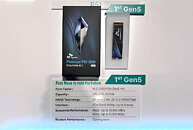TheLostSwede
News Editor
- Joined
- Nov 11, 2004
- Messages
- 18,475 (2.47/day)
- Location
- Sweden
| System Name | Overlord Mk MLI |
|---|---|
| Processor | AMD Ryzen 7 7800X3D |
| Motherboard | Gigabyte X670E Aorus Master |
| Cooling | Noctua NH-D15 SE with offsets |
| Memory | 32GB Team T-Create Expert DDR5 6000 MHz @ CL30-34-34-68 |
| Video Card(s) | Gainward GeForce RTX 4080 Phantom GS |
| Storage | 1TB Solidigm P44 Pro, 2 TB Corsair MP600 Pro, 2TB Kingston KC3000 |
| Display(s) | Acer XV272K LVbmiipruzx 4K@160Hz |
| Case | Fractal Design Torrent Compact |
| Audio Device(s) | Corsair Virtuoso SE |
| Power Supply | be quiet! Pure Power 12 M 850 W |
| Mouse | Logitech G502 Lightspeed |
| Keyboard | Corsair K70 Max |
| Software | Windows 10 Pro |
| Benchmark Scores | https://valid.x86.fr/yfsd9w |
SK hynix press release about its upcoming PCB01 PCIe 5.0 SSD was a bit light on details and Anandtech got a closer look at the upcoming drive at GTC 2024. Not entirely unsurprising, the drive will be called the Platinum P51 rather than the PCB01, which is a continuation of the branding SK hynix is using for its current range of SSDs. As we already know, it'll feature a custom SK hynix controller and no further data was revealed to Anandtech, but the publication did manage to get some more details with regards to the NAND flash used.
The Platinum P51 is SK hynix first consumer SSD with its new-ish 238-layer 4D NAND flash based on the company's PUC (peri. under cell) technology, which places the peripheral circuits under the cell array. The official performance figures of the Platinum P51 appears to be somewhat lower than the press release from earlier today stated, with sequential read speeds of up to 13.5 GB/s and sequential write speeds of 11.5 GB/s. SK hynix will apparently release the drive in the typical SSD sizes of 500 GB, 1 TB and 2 TB. It'll be interesting how SK hynix in-house controller will compare to the second generation of Phison E26 based drives paired with Micron B58R NAND flash once it becomes available later this year.


View at TechPowerUp Main Site | Source
The Platinum P51 is SK hynix first consumer SSD with its new-ish 238-layer 4D NAND flash based on the company's PUC (peri. under cell) technology, which places the peripheral circuits under the cell array. The official performance figures of the Platinum P51 appears to be somewhat lower than the press release from earlier today stated, with sequential read speeds of up to 13.5 GB/s and sequential write speeds of 11.5 GB/s. SK hynix will apparently release the drive in the typical SSD sizes of 500 GB, 1 TB and 2 TB. It'll be interesting how SK hynix in-house controller will compare to the second generation of Phison E26 based drives paired with Micron B58R NAND flash once it becomes available later this year.


View at TechPowerUp Main Site | Source





